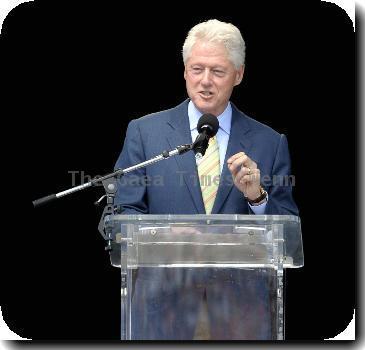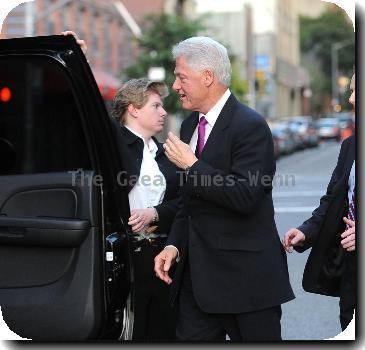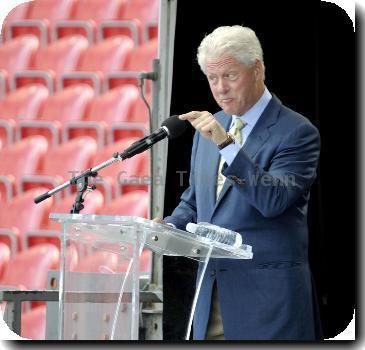New book casts UK’s Brown as angry and abusive to staff as British election gets tighter
By Raphael G. Satter, APSunday, February 21, 2010
New book casts UK’s Brown as angry, abusive
LONDON — On Sunday the British public was introduced to what one political journalist has painted as the dark face of the country’s prime minister: An angry and abusive man whose rages were so intense the country’s top bureaucrat had to intervene to comfort his distressed staff.
The description, carried in book “The End of the Party,” by The Observer journalist Andrew Rawnsley, is vigorously contested by Prime Minister Gordon Brown and his lieutenants — who say that, while the prime minister does get angry, he’s not a bully.
Rawnsley’s book and its contents, extracts of which were published in an eight-page spread in The Observer, dominated Britain’s media Sunday. And Brown faced further embarrassment when the head of a British anti-bullying charity claimed that staff at his No. 10 Downing Street office had contacted her group complaining about the workplace atmosphere.
In one passage, Rawnsley’s book describes Brown as furious when a journalist identified similarities between an address he gave at Labour’s 2007 conference and speeches given by Al Gore and Bill Clinton. Bob Shrum, who worked for both before taking on a job as speech writer for Brown, was left shaking by an expletive-laden outburst from the prime minister, according to Rawnsley.
In another passages, the book describes Brown yanking a secretary from her chair when she typed too slowly, and says he flew into rages so regularly that a nearby chair was dotted with marks from where he stabbed it with a pen.
At one point, the book said, Cabinet Secretary Gus O’Donnell had to intervene to calm the situation down.
“Rage, despair and indecision. Inside Gordon Brown’s Number 10,” The Observer’s headline read. The Independent on Sunday, carrying an interview with Brown, summarized the prime minister’s thoughts on the book in four big black letters: “LIES!”
Speaking to the Independent, Brown seemed particularly upset at rumors that the published extracts would carry allegations that he hit members of staff. They didn’t, although there were references to alleged incidents in which the prime minister grabbed an aide by the lapels or manhandled a senior adviser.
“It is simply a lie to say I’ve hit anybody in my life,” Brown told the paper. “I may have done one or two good tackles at rugby but this so-called inside account is just ludicrous.”
The excerpts’ publication comes as Britain’s looming general election is getting closer, tighter and more personal.
Brown’s party still trails in the polls, although a few recent ones show the race between him and his Conservative Party challenger, David Cameron, tightening. Some surveys have suggested that, while Labour was likely to fall short of a parliamentary majority, it could still cling to power after the election, which must be held by June 3.
On the morning talk shows, Brown loyalists were out doing damage control.
“These things that have been put in the book are wrong and have been denied,” Brown’s Labour Party deputy Harriet Harman told Sky News television. She agreed that Brown could be tough — “Nobody said he was a shrinking violet,” she said — but she added that “that’s a good thing, not a bad thing.”
Acknowledging that Brown’s temper had long been the subject of media speculation, Business Secretary Peter Mandelson sought to cast Brown as passionate rather than petulant.
The prime minister “gets angry, but chiefly with himself” Mandelson told the BBC, adding that the book didn’t present a picture of Brown which he recognized.
But their defense of Brown was criticized by British National Bullying Helpline chief Christine Pratt, who said she’d “seen red” when ministers took to the television screens to defend their boss.
“I have personally taken a call from staff in the prime minister’s office, staff who believe they are working in a bullying culture and that it has caused them some stress,” she said.
“I am not saying Gordon Brown is a bully, I am not a judge. But I am appalled at the outright denial that is going on without due process being followed.”
It wasn’t clear from Pratt’s comments precisely who she was talking about. A Downing Street spokesman said he had “no comment to offer at this stage.”
Rawnsley also defended his work, saying it was based on thousands of interviews with hundreds of people both inside and out of government over the years. It follows the ups and downs of Brown’s governing Labour Party, but the most talked about passages — many of which are sourced anonymously — deal with Brown’s allegedly explosive rages.
The discomfiting take on Brown’s personality comes at time when the prime minister has sought to humanize his distant and often dour image. A recent interview with Britain’s ITV showed the prime minister in an unusually emotional discussion about the death of his newborn daughter in 2002.
In the interview, which was seen by more than 4 million people, Brown also described his proposal to his wife Sarah, discussed his love life as a younger man and spoke in unusually frank terms about his clashes with his predecessor, Tony Blair.
In an editorial piece in The Observer, Rawnsley defended his focus on Brown’s character, referring to the ITV interview as an example when the prime minister had consciously sought to project his personality “in a way that might make it more appealing to voters.”
That, he said, was the “Good Brown,” adding that there was also a “Bad Brown” lurking behind the scenes.
“The public deserves to be fully acquainted with both,” he said.




